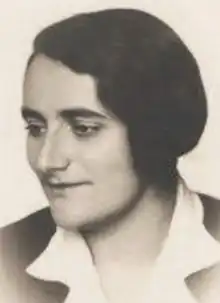Clara Lazar Geroe
Clara Lazar Geroe born Klára Lazar (October 4, 1900 – February 12, 1980) was a Hungarian-Australian psychiatrist. She began practicing psychoanalysis in 1932 in Budapest and in 1941 in Melbourne.
Clara Lazar Geroe | |
|---|---|
 | |
| Born | Klára Lazar October 4, 1900 |
| Died | February 12, 1980 |
| Nationality | Hungary |
| Education | University of Pécs |
Life
Geroe was born in Pápa in Hungary in 1900. Her Jewish parents were Ilona (born Lusztig) and her husband Adolf Adam Lazar. Her parents did not send her to a Jewish school but a Calvinist secondary school. She became interested in psychoanalysis after reading a book by Sandor Ferenczi. At the end of World War One, Hungary was in a political turmoil and this chaos effected her education. She did not graduate until 1924 when the University of Pécs awarded her a degree in medicine.[1]
Geroe was one of Michael Balint's students and she started her own practice in 1932 in Budapest.[1] Balint was employed at Fereczi's Budapest Psychoanalytical Institute becoming its director in 1935.[2] The political conditions in Hungary made life very difficult for Jews. John Rickman advised all Jewish analysts in Hungary to leave. Michael Balint went to the UK.[2] Geroe discussed going to New Zealand in a party of six Hungarian analysts in 1938 but the Commonwealth Department of Immigration refused the application. Leading figures lobbied for the six to be accepted but only Geroe was allowed to emigrate. She and her husband and son arrived in Melbourne in 1940.[1]
She was employed at the Melbourne Institute for Psychoanalysis and she was the prime author of its first annual report in 1941.[3] Although she had few formal qualifications she was known as "Dr Geroe" and she was arranging Freudian classes. Her right to practice medicine arrived in 1956 long after she began lecturing at the University of Melbourne or being employed as a psychoanalyst by the Royal Melbourne Hospital.[1]
The writer and philosopher Tamas Pataki has written about his own analysis by Geroe in Melbourne. He remembers her as being old.[4] Her office (where she had a couch with a Turkish rug like Freud used[1]) was just off the institute's library. Clients would wait patiently as others were moved from room to room to preserve their anonymity, while they waited, subject to Geroe's poor time management.[4]
References
- Brett, Judith, "Clara Lazar Geroe (1900–1980)", Australian Dictionary of Biography, Canberra: National Centre of Biography, Australian National University, retrieved 2023-10-03
- Hopkins, Philip (2004-09-23). Balint, Michael Maurice [formerly Mihaly Bergsmann] (1896–1970), psychoanalyst. Vol. 1. Oxford University Press. doi:10.1093/ref:odnb/51076.
- Lazar-Geroe, Clara; Dane, P. G.; Ellery, R. S. (October 1942). "First Annual Report of the Melbourne Institute for Psychoanalysis for the Year 1941". The Psychoanalytic Quarterly. 11 (4): 611–617. doi:10.1080/21674086.1942.11950906. ISSN 0033-2828.
- Pataki, Tamas (2014-04-24). Wish-fulfilment in Philosophy and Psychoanalysis: The tyranny of desire. Routledge. ISBN 978-1-135-90368-8.